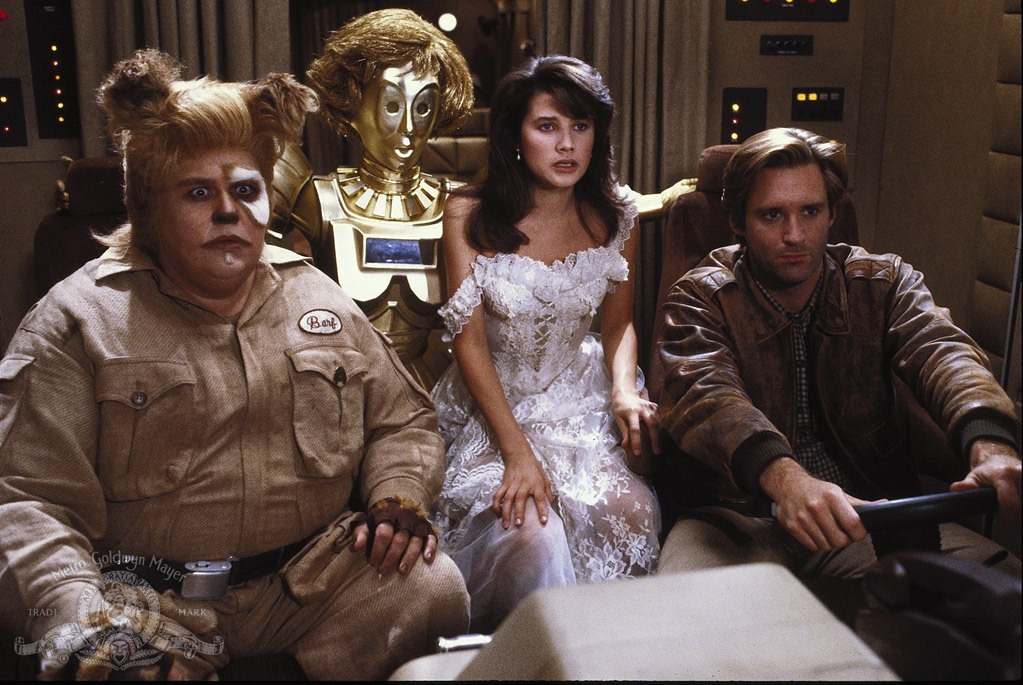Spaceballs (1987)

“Spaceballs,” released in 1987 and directed by Mel Brooks, is a beloved parody of the science fiction genre, particularly the “Star Wars” saga. This comedy film, known for its irreverent humor and clever satire, stars a talented ensemble cast including Brooks himself, John Candy, Rick Moranis, and Bill Pullman. “Spaceballs” not only serves as a humorous critique of space opera tropes but also stands out for its distinctive comedic style and memorable performances. This essay explores the film’s plot, characters, production values, reception, and its lasting impact on both comedy and science fiction.
The plot of “Spaceballs” is a satirical homage to the “Star Wars” franchise, blending elements from the beloved space opera with Mel Brooks’ signature comedic touch. The story unfolds in a galaxy far, far away, where the evil Spaceballs, led by the bumbling President Skroob (Mel Brooks), are plotting to steal the atmosphere from the peaceful planet of Druidia to save their own planet, Spaceball. Their scheme involves capturing Princess Vespa (Daphne Zuniga) and using her to coerce her father, King Roland (Nicolas Point), into surrendering Druidia’s air supply.

The central hero of the film is Lone Starr (Bill Pullman), a rogue space pilot who, along with his sidekick Barf (John Candy), is hired to rescue Princess Vespa and thwart the Spaceballs’ plan. Alongside them is the mystical figure Yogurt (Mel Brooks), who provides guidance and wisdom in the form of parodic lessons about “the Schwartz,” a comedic twist on “the Force” from “Star Wars.”
As Lone Starr and Barf embark on their mission, they encounter a range of eccentric characters and face various comedic obstacles, all while the film delivers a series of gags and references to the popular sci-fi genre. The film culminates in a climactic showdown between the forces of good and evil, featuring an abundance of slapstick humor and witty dialogue.
One of the film’s key strengths is its ensemble cast, who bring a range of comedic styles to their roles:
Mel Brooks plays multiple roles, including President Skroob and Yogurt. His performance as Skroob is characterized by a mix of absurdity and authoritative blunders, while his portrayal of Yogurt offers a parody of Jedi wisdom, complete with humorous commentary on merchandising and pop culture.

Bill Pullman stars as Lone Starr, embodying the archetypal hero with a comedic twist. Pullman’s portrayal captures the essence of the roguish hero while also poking fun at the conventions of space opera protagonists.
John Candy as Barf provides comic relief as the loyal and larger-than-life sidekick. His performance is marked by a blend of physical comedy and heartfelt moments, contributing to the film’s charm.
Rick Moranis plays the villainous Dark Helmet, a parody of Darth Vader. Moranis’s performance is noted for its exaggerated and humorous take on the iconic villain, complete with comedic battle sequences and a memorable reveal of the helmet’s inner workings.
Daphne Zuniga as Princess Vespa offers a comedic take on the classic damsel-in-distress trope, bringing a blend of sass and wit to her role.
Mel Brooks’s direction of “Spaceballs” is characterized by a sharp, satirical approach to the space opera genre. The film’s production design, including costumes and sets, cleverly mimics the look of “Star Wars” while also incorporating humorous touches that underscore the film’s parody nature. The special effects, while intentionally campy, are used to great comedic effect, with visual gags and absurd scenarios that enhance the film’s humor.

The screenplay, co-written by Brooks, Thomas Meehan, and Ronny Graham, is rich with references and parodies of the sci-fi genre. The dialogue is fast-paced and laden with jokes, making it a treasure trove for fans of both comedy and science fiction. The film’s ability to balance satire with its own narrative ensures that it remains engaging and entertaining throughout.
Upon its release, “Spaceballs” received generally positive reviews from critics, who praised its clever humor and affectionate parody of the space opera genre. The film was particularly noted for its ability to appeal to both fans of science fiction and general audiences through its broad comedic style and inventive gags.
“Spaceballs” has since achieved cult status, becoming a staple of comedic cinema and a beloved classic among fans of Mel Brooks’s work. Its influence can be seen in subsequent parodies and comedic treatments of popular genres, demonstrating Brooks’s impact on the art of satire and parody.

The film’s legacy also includes its memorable lines and iconic scenes, which continue to be referenced in popular culture. It serves as a prime example of how parody can both celebrate and critique its source material, blending affection with humor to create a lasting comedic impression.
In conclusion, “Spaceballs” (1987) stands out as a quintessential parody of the science fiction genre, combining Mel Brooks’s distinctive comedic style with a loving homage to the space opera tradition. Through its clever satire, memorable performances, and inventive humor, the film remains a beloved classic that continues to entertain audiences and inspire subsequent works in the genre. Its impact on comedy and science fiction underscores the enduring appeal of Brooks’s brand of humor and the film’s place in cinematic history.











